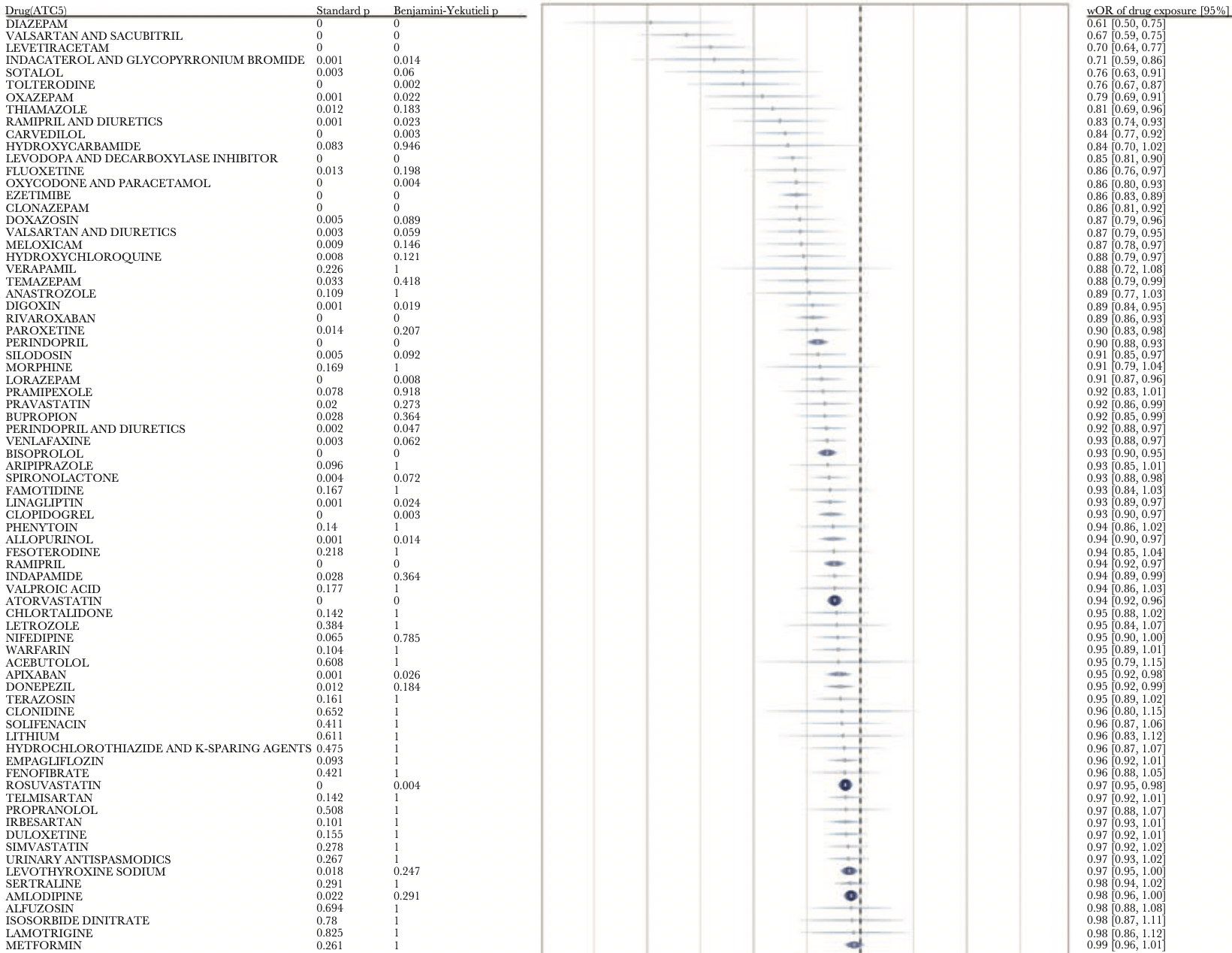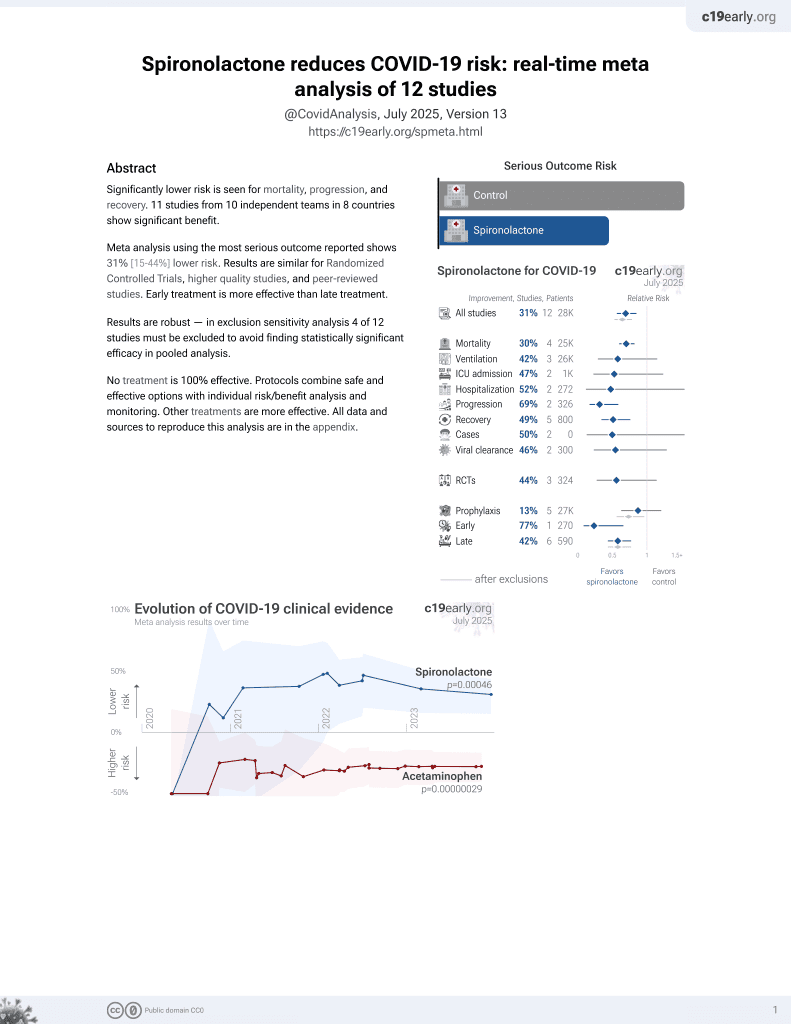
Screening Large Population Health Databases for Potential COVID-19 Therapeutics: A Pharmacopeia-Wide Association Study (PWAS) of Commonly Prescribed Medications
et al., Open Forum Infectious Diseases, doi:10.1093/ofid/ofac156, Mar 2022
37th treatment shown to reduce risk in
February 2022, now with p = 0.00046 from 12 studies.
No treatment is 100% effective. Protocols
combine treatments.
6,400+ studies for
210+ treatments. c19early.org
|
Retrospective 26,121 cases and 2,369,020 controls ≥65yo in Canada, showing lower cases with chronic use of spironolactone.
Study covers HCQ, metformin, famotidine, spironolactone, vitamin B9, acetaminophen, and fluvoxamine.
|
risk of case, 7.0% lower, OR 0.93, p = 0.008, RR approximated with OR.
|
| Effect extraction follows pre-specified rules prioritizing more serious outcomes. Submit updates |
MacFadden et al., 29 Mar 2022, retrospective, Canada, peer-reviewed, 9 authors, study period 15 January, 2020 - 31 December, 2020.
Contact: dmacfadden@toh.ca.
DOI record:
{
"DOI": "10.1093/ofid/ofac156",
"ISSN": [
"2328-8957"
],
"URL": "http://dx.doi.org/10.1093/ofid/ofac156",
"abstract": "<jats:title>Abstract</jats:title>\n <jats:sec>\n <jats:title>Background</jats:title>\n <jats:p>For both the current and future pandemics, there is a need for high-throughput drug screening methods to identify existing drugs with potential preventative and/or therapeutic activity. Epidemiologic studies could complement lab-focused efforts to identify possible therapeutic agents.</jats:p>\n </jats:sec>\n <jats:sec>\n <jats:title>Methods</jats:title>\n <jats:p>We performed a pharmacopeia-wide association study (PWAS) to identify commonly prescribed medications and medication classes that are associated with the detection of SARS-CoV-2 in older individuals (&gt;65 years) in long-term care homes (LTCH) and the community, between January 15 th, 2020 and December 31 st, 2020, across the province of Ontario, Canada.</jats:p>\n </jats:sec>\n <jats:sec>\n <jats:title>Results</jats:title>\n <jats:p>26,121 cases and 2,369,020 controls from LTCH and the community were included in this analysis. Many of the drugs and drug classes evaluated did not yield significant associations with SARS-CoV-2 detection. However, some drugs and drug classes appeared significantly associated with reduced SARS-CoV-2 detection, including cardioprotective drug classes such as statins (weighted OR 0.91, standard p-value &lt;0.01, adjusted p-value &lt;0.01) and beta-blockers (weighted OR 0.87, standard p-value &lt;0.01, adjusted p-value 0.01), along with individual agents ranging from levetiracetam (weighted OR 0.70, standard p-value &lt;0.01, adjusted p-value &lt;0.01) to fluoxetine (weighted OR 0.86, standard p-value 0.013, adjusted p-value 0.198) to digoxin (weighted OR 0.89, standard p-value &lt;0.01, adjusted p-value 0.02).</jats:p>\n </jats:sec>\n <jats:sec>\n <jats:title>Conclusions</jats:title>\n <jats:p>Using this epidemiologic approach which can be applied to current and future pandemics we have identified a variety of target drugs and drug classes that could offer therapeutic benefit in COVID-19 and may warrant further validation. Some of these agents (e.g. fluoxetine) have already been identified for their therapeutic potential.</jats:p>\n </jats:sec>",
"author": [
{
"affiliation": [
{
"name": "The Ottawa Hospital Research Institute, Clinical Epidemiology Program, Ottawa, Canada"
},
{
"name": "ICES, Toronto, Ontario, Canada"
}
],
"family": "MacFadden",
"given": "Derek R",
"sequence": "first"
},
{
"affiliation": [
{
"name": "Dalla Lana School of Public Health, University of Toronto, Canada"
},
{
"name": "Public Health Ontario, Toronto, Canada"
},
{
"name": "ICES, Toronto, Ontario, Canada"
}
],
"family": "Brown",
"given": "Kevin",
"sequence": "additional"
},
{
"ORCID": "http://orcid.org/0000-0002-5286-8974",
"affiliation": [
{
"name": "Dalla Lana School of Public Health, University of Toronto, Canada"
},
{
"name": "Public Health Ontario, Toronto, Canada"
},
{
"name": "ICES, Toronto, Ontario, Canada"
}
],
"authenticated-orcid": false,
"family": "Buchan",
"given": "Sarah A",
"sequence": "additional"
},
{
"ORCID": "http://orcid.org/0000-0002-9463-3591",
"affiliation": [
{
"name": "ICES, Toronto, Ontario, Canada"
}
],
"authenticated-orcid": false,
"family": "Chung",
"given": "Hannah",
"sequence": "additional"
},
{
"affiliation": [
{
"name": "Department of Family and Community Medicine, University of Toronto, Canada"
},
{
"name": "Sunnybrook Research Institute, Toronto, Ontario, Canada"
}
],
"family": "Kozak",
"given": "Rob",
"sequence": "additional"
},
{
"affiliation": [
{
"name": "Dalla Lana School of Public Health, University of Toronto, Canada"
},
{
"name": "Public Health Ontario, Toronto, Canada"
},
{
"name": "ICES, Toronto, Ontario, Canada"
},
{
"name": "Department of Family and Community Medicine, University of Toronto, Canada"
}
],
"family": "Kwong",
"given": "Jeffrey C",
"sequence": "additional"
},
{
"affiliation": [
{
"name": "The Ottawa Hospital Research Institute, Clinical Epidemiology Program, Ottawa, Canada"
},
{
"name": "ICES, Toronto, Ontario, Canada"
}
],
"family": "Manuel",
"given": "Doug",
"sequence": "additional"
},
{
"affiliation": [
{
"name": "Sunnybrook Research Institute, Toronto, Ontario, Canada"
},
{
"name": "Sunnybrook Health Sciences Centre, University of Toronto, Toronto, Ontario, Canada"
}
],
"family": "Mubareka",
"given": "Samira",
"sequence": "additional"
},
{
"affiliation": [
{
"name": "Public Health Ontario, Toronto, Canada"
},
{
"name": "ICES, Toronto, Ontario, Canada"
},
{
"name": "Sunnybrook Research Institute, Toronto, Ontario, Canada"
},
{
"name": "Sunnybrook Health Sciences Centre, University of Toronto, Toronto, Ontario, Canada"
}
],
"family": "Daneman",
"given": "Nick",
"sequence": "additional"
}
],
"container-title": "Open Forum Infectious Diseases",
"content-domain": {
"crossmark-restriction": false,
"domain": []
},
"created": {
"date-parts": [
[
2022,
3,
29
]
],
"date-time": "2022-03-29T23:20:55Z",
"timestamp": 1648596055000
},
"deposited": {
"date-parts": [
[
2022,
3,
29
]
],
"date-time": "2022-03-29T23:20:56Z",
"timestamp": 1648596056000
},
"indexed": {
"date-parts": [
[
2022,
3,
30
]
],
"date-time": "2022-03-30T04:04:47Z",
"timestamp": 1648613087462
},
"is-referenced-by-count": 0,
"issued": {
"date-parts": [
[
2022,
3,
29
]
]
},
"language": "en",
"license": [
{
"URL": "https://creativecommons.org/licenses/by-nc-nd/4.0/",
"content-version": "am",
"delay-in-days": 0,
"start": {
"date-parts": [
[
2022,
3,
29
]
],
"date-time": "2022-03-29T00:00:00Z",
"timestamp": 1648512000000
}
}
],
"link": [
{
"URL": "https://academic.oup.com/ofid/advance-article-pdf/doi/10.1093/ofid/ofac156/43152161/ofac156.pdf",
"content-type": "application/pdf",
"content-version": "am",
"intended-application": "syndication"
},
{
"URL": "https://academic.oup.com/ofid/advance-article-pdf/doi/10.1093/ofid/ofac156/43152161/ofac156.pdf",
"content-type": "unspecified",
"content-version": "vor",
"intended-application": "similarity-checking"
}
],
"member": "286",
"original-title": [],
"prefix": "10.1093",
"published": {
"date-parts": [
[
2022,
3,
29
]
]
},
"published-online": {
"date-parts": [
[
2022,
3,
29
]
]
},
"publisher": "Oxford University Press (OUP)",
"reference-count": 0,
"references-count": 0,
"relation": {},
"resource": {
"primary": {
"URL": "https://academic.oup.com/ofid/advance-article/doi/10.1093/ofid/ofac156/6555707"
}
},
"score": 1,
"short-title": [],
"source": "Crossref",
"subject": [
"Infectious Diseases",
"Oncology"
],
"subtitle": [],
"title": "Screening Large Population Health Databases for Potential COVID-19 Therapeutics: A Pharmacopeia-Wide Association Study (PWAS) of Commonly Prescribed Medications",
"type": "journal-article"
}
macfaddenaa
